外研社必修1Module 4 A social survey Cultural corner
外研版高中英语必修一unit4 a social survey单元教案
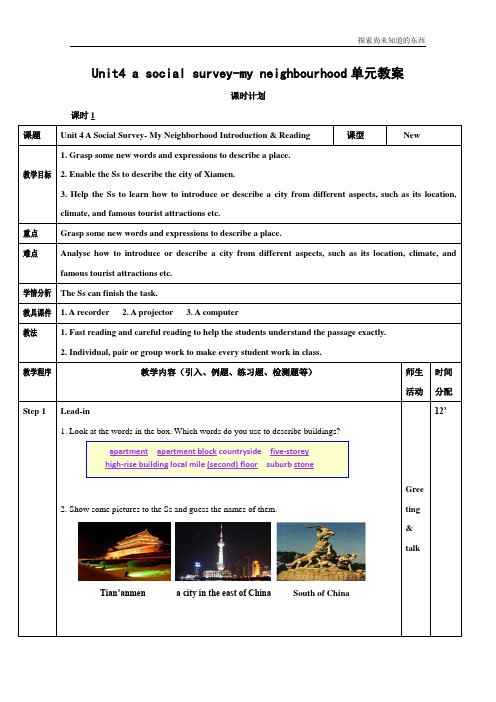
Unit4 a social survey-my neighbourhood 单元教案课时计划课时1课题Unit 4 A Social Survey- My Neighborhood Introduction & Reading 课型New教学目标1. Grasp some new words and expressions to describe a place.2. Enable the Ss to describe the city of Xiamen.3. Help the Ss to learn how to introduce or describe a city from different aspects, such as its location, climate, and famous tourist attractions etc.重点Grasp some new words and expressions to describe a place.难点Analyse how to introduce or describe a city from different aspects, such as its location, climate, and famous tourist attractions etc.学情分析The Ss can finish the task.教具课件 1. A recorder 2. A projector 3. A computer教法 1. Fast reading and careful reading to help the students understand the passage exactly.2. Individual, pair or group work to make every student work in class.教学程序教学内容(引入、例题、练习题、检测题等)师生活动时间分配Step 1 Lead-in1. Look at the words in the box. Which words do you use to describe buildings?2. Show some pictures to the Ss and guess the names of them.Tian’anmen a city in the east of China South of China Greeting&talk12’apartment apartment block countryside five-storey high-rise building local mile (second) floor suburb stoneStep 2Eiffel Tower between the Pacific Ocean and the Indian OceanHave you ever been to this city? The scenery of Gulangyu Island, XiamenReading1. Pre-reading1) Listen to the tape and choose the correct answers.(1) John Martin is visiting ______A_____.(a) Xiao Li’s hometown(b) a town near where Xiao Li lives(c) a shopping mall(2) Xiao Li lives ____B_____.(a) on the island of Gulangyu(b) in Xiamen(c) in a town to the northwest of Xiamen(3) John and Xiao Li are __B__.(a) at Xiao Li’s home(b) driving around the city in a car(c) on a train2. Detail readingRead&learn32’课时计划课时2课时计划课时3重点Find the main idea of the Cultural Corner.难点Find the main idea of the Cultural Corner.学情分析The Ss can finish the task.教具课件 1. A recorder 2. A projector 3. A computer教法 1. Revision to help the students consolidate the language points of this unit.2. Fast reading and careful reading to help the students understand the passage exactly.教学程序教学内容(引入、例题、练习题、检测题等)师生活动时间分配Step 1Step 2Revision1. Recite the text2. Recite New Concept English Book II Lesson 6~10Lead-in1. Listen to a song1) What’s the name of this song?Country road, take me home.2) Can you guess who sing this song?It is sung by John Denver. John Denver is a very famous singer of country music all overthe world.2. While listening to this song, what can we imagine about the western countryside?Cultural Corner1. Listen the text and answer the following question.10’8’课时计划课时4课时计划课时5。
【英语必修一外研版】Module 4 A social Survey-My Neighbourhood:Period 4 culture corner+writing-教学
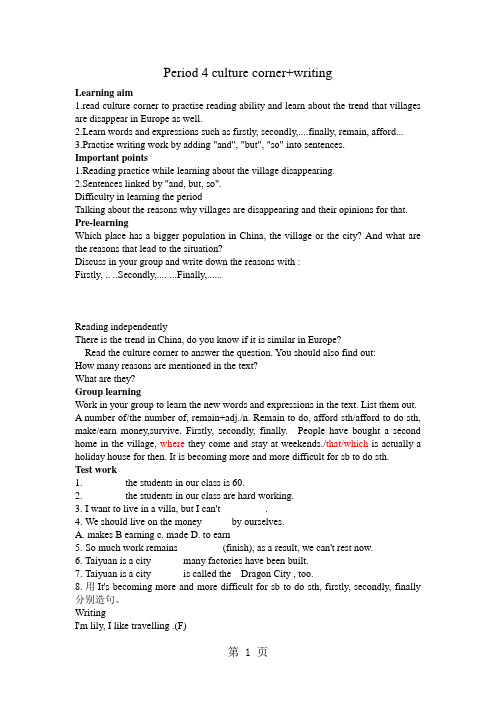
Period 4 culture corner+writingLearning aim1.read culture corner to practise reading ability and learn about the trend that villages are disappear in Europe as well.2.Learn words and expressions such as firstly, secondly,....finally, remain, afford...3.Practise writing work by adding "and", "but", "so" into sentences.Important points1.Reading practice while learning about the village disappearing.2.Sentences linked by "and, but, so".Difficulty in learning the periodTalking about the reasons why villages are disappearing and their opinions for that. Pre-learningWhich place has a bigger population in China, the village or the city? And what are the reasons that lead to the situation?Discuss in your group and write down the reasons with :Firstly, .. ..Secondly,.... ...Finally,......_____________________________________________________________________ _____________________________________________________________________ _____________________________________________________________________ Reading independentlyThere is the trend in China, do you know if it is similar in Europe?Read the culture corner to answer the question. You should also find out:How many reasons are mentioned in the text?What are they?Group learningWork in your group to learn the new words and expressions in the text. List them out.A number of/the number of, remain+adj./n. Remain to do, afford sth/afford to do sth, make/earn money,survive. Firstly, secondly, finally. People have bought a second home in the village, where they come and stay at weekends./that/which is actually a holiday house for then. It is becoming more and more difficult for sb to do sth.Test work1.________the students in our class is 60.2.________the students in our class are hard working.3.I want to live in a villa, but I can't_________.4.We should live on the money______by ourselves.A.makes B earning c. made D. to earn5.So much work remains_________(finish), as a result, we can't rest now.6.Taiyuan is a city ______many factories have been built.7.Taiyuan is a city ______is called the Dragon City , too.8.用It's becoming more and more difficult for sb to do sth, firstly, secondly, finally 分别造句。
外研社版高一必修1_Module_4_A_Social_Survey-My_Neighborhood_ppt课件3

Write
a short report according to what you get from the survey about your classmates’ study in school. Use the present perfect tense when necessary.
附:
附:
(高考题)
答案:B
2. (NMET 1992) --Do you know our town at all? --No, this is the first time I ____here. A. was B. have been C. came D. am coming
附:
(高考题)
3. (NMET 1999) The price _____, but I doubt whether it will remain so. A. went down B. will go down C. has gone down D. was going down 答案:C
know live remain stay …
borrow give leave buy open put send …
Grammar 2 -3.Creative thinking(5m) Finish the missing part of the sentences.
1.
2.
3.
4.
Up to now, I’ve realized that he ______________________________________. Great changes _________________ in my hometown these years. So far as I know, my aunt ______________________________________. Professor Cartel ___________________ since a week ago.
高中-英语-外研版-必修一Module 4 A social survey 课件(共21张PPT)

Step 3: task 2 A report on Chinese villages
Q1: how is Chinese house price in villages? (para 1) Q2: how is the Chinese environment? (para 2) Q3: what does public services and infrastructure include? (para 3) Q4: how many problems are caused by immigrant workers? (para 4) Q5: how is the quality of education in Chinese villages? (para 5)
students' attention and
activate students'
Greeting and talk about the environment and former memory about
infrastructure of European villages
European villages'
topic.
protesting
Part 1
Part 2 Part 3 Part 4
Step 2: cultural corner
Task 1: Read for the details-----ask students to read the text and find out the detailed information.
Part 1
Part 2 Part 3 Part 4
Step 3: culture link
外研版高中英语必修一unit4 a social survey单元教案1
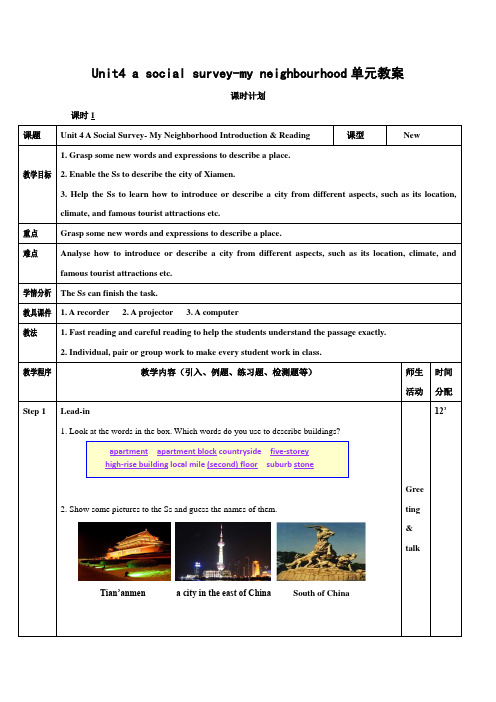
Unit4 a social survey-my neighbourhood单元教案课时计划课时1课题Unit 4 A Social Survey- My Neighborhood Introduction & Reading 课型New教学目标1. Grasp some new words and expressions to describe a place.2. Enable the Ss to describe the city of Xiamen.3. Help the Ss to learn how to introduce or describe a city from different aspects, such as its location, climate, and famous tourist attractions etc.重点Grasp some new words and expressions to describe a place.难点Analyse how to introduce or describe a city from different aspects, such as its location, climate, and famous tourist attractions etc.学情分析The Ss can finish the task.教具课件 1. A recorder 2. A projector 3. A computer教法 1. Fast reading and careful reading to help the students understand the passage exactly.2. Individual, pair or group work to make every student work in class.教学程序教学内容(引入、例题、练习题、检测题等)师生活动时间分配Step 1 Lead-in1. Look at the words in the box. Which words do you use to describe buildings?2. Show some pictures to the Ss and guess the names of them.Tian’anmen a city in the east of China South of China Greeting&talk12’apartment apartment block countryside five-storey high-rise building local mile (second) floor suburb stoneEiffel Tower between the Pacific Ocean and the Indian Ocean Have you ever been to this city? The scenery of Gulangyu Island, XiamenReading1. Pre-reading1) Listen to the tape and choose the correct answers.(1) John Martin is visiting ______A_____.(a) Xiao Li’s hometown(b) a town near where Xiao Li lives(c) a shopping mall(2) Xiao Li lives ____B_____.(a) on the island of Gulangyu(b) in Xiamen(c) in a town to the northwest of Xiamen(3) John and Xiao Li are __B__.(a) at Xiao Li’s home(b) driving around the city in a car(c) on a train2. Detail reading Read&learn32’Step 2课时计划课时2课时计划课时3重点Find the main idea of the Cultural Corner.难点Find the main idea of the Cultural Corner.学情分析The Ss can finish the task.教具课件 1. A recorder 2. A projector 3. A computer教法 1. Revision to help the students consolidate the language points of this unit.2. Fast reading and careful reading to help the students understand the passage exactly.教学程序教学内容(引入、例题、练习题、检测题等)师生活动时间分配Step 1 Step 2 Revision1. Recite the text2. Recite New Concept English Book II Lesson 6~10Lead-in1. Listen to a song1) What’s the name of this song?Country road, take me home.2) Can you guess who sing this song?It is sung by John Denver. John Denver is a very famous singer of country music all overthe world.2. While listening to this song, what can we imagine about the western countryside?Cultural Corner1. Listen the text and answer the following question.10’8’课时计划课时4课时计划课时5。
高三英语Module 4教案及习题外研版必修一

Module 4 A Social Survey – My Neighbourhood课标要求概览:重点单词: survey n.调查 neighborhood n . 邻居;街坊 local adj .地方的;局部的 suburb n .郊区 hometown n .家乡 pretty adv .很;相当 sound vi .听起来 tourist n .旅游者;观光者 bother vt .打扰;麻烦 nuisance n .令人讨厌的人或事 rent n .租金 district n .地区;区域 approach vt . 接近;方法 harbor n .海港 gorgeous adj .美丽的;宜人的 architecture n .建筑 starve vi .饿死 park vt . 停车 traffic n . 交通 mittee n .委员会 organization n .组织 household n .家属;家人 occupation n .职业 professional adj .专业的 manual adj .用手的;手的 gallery n .美术馆;画廊 exchange vt .交换 fascinating adj .迷人的;吸引人的 afford vt . survive v i.死里逃生;幸存 contact vt .词汇拓展: 1. fortunate(adj)幸运的→fortunately(adv .)→unfortunate 〕→fortune (n .) 2. unemployed(adj)失业的→unemploy (v .)→unemployment(n .)失业 3. tourist →tour(n .)旅游,观光→tourism(n .)旅游业 4.attractive(adj)吸引人的→attraction(n .)吸引力(u.);吸引人的事物(c.)→attract(v .) 5. starve(v .)→starvation(n .)饥饿 重点短语: 1. apartment block 公寓大楼2. be similar to 与……相似 3. on the coast 在海岸边4. by the seaside 在海滨 5. would like/love/prefer to do 愿意做某事 7. as a result 因此,结果 6. so far/ up to now/ till now 直到现在 8. such as 诸如…,例如 9. go up 上升,上涨 10. more and more 越来越…… 11. make money 挣钱 12. put up 建造,X 贴 13. get away from 摆脱 要点归纳: 1. “Her parents are farmers and have recently built a house on their land as their new house.〞 ◢as 用法小结: 1)引导状语从句: (1)“当……时候〞,引导时间状语从句 eg. As she sang, the tears ran down her cheeks. (2)“因为,由于〞,引导原因状语从句 eg. As Jim liked walking, we started off on foot. (3)“如,像〞,引导方式状语从句或比较状语从句。
外研版高中英语必修1 module 4《a social survey-my neighbourhood》(第二课时)教案
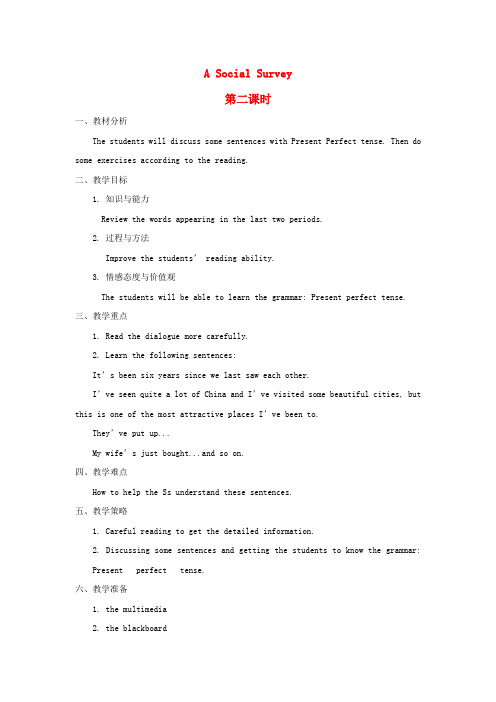
A Social Survey第二课时一、教材分析The students will discuss some sentences with Present Perfect tense. Then do二、教学目标1. 知识与能力2. 过程与方法Improve the students’ reading3. 情感态度与价值观The students will be able to learn the grammar:三、教学重点1.2. Learn the following sentencesI’ve seen quite a lot of China and I’ve visited some beautiful cities, but四、教学难点五、教学策略1. Careful reading to get2. Discussing some sentences and getting the students to know the grammar:六、教学准备1.2.七、教学环节(一)课堂引入(Get the Ss to review some words in the Reading part. Show the following on((((((( )ca((((((Suggested answers1.lucky2.very hot3.give you problems4.causing problems5.shoppingcenter7.T: Next please look at these words. Who can read them?T: Li Ming,L:(二)课堂讲授(Get the students to read the dialogue again. After a while, show the sentences,1.2.3.4.(Make sure that the students know how to use and and but and understand these sentences, especially the form of the Present perfect tense.)Then ask some good students to read the dialogue.(三)课堂练习T: Let’s carry on a dialogue.T: Hi,W: Hi, I’mW: When did you come here?T: Yesterday. I’m here to attend a meeting. And I want to go to the library. Can you show me the way?W: Oh. Follow this road and take the first right. Keep straight on, and you willT: Thank you very much. Good-bye. W: Bye-bye.T: Very good. Thank you for your cooperation. Now all of you carry on a dialoguelike this. Are you clear about that?T: OK. Begin,(After a while,(四)课堂活动(五)In order to make the students know more about China and New Zealand(The foreign teacher in our school comes from New Zealand . If they don’t know much about New Zealand, they can interview her. Get them to compare the climate inChina(五)课堂小结 1.1. It has a mild sea climate.(六)作业布置T: Today we have learned some useful expressions. After class, read the dialogue,put the useful expressions into heart and preview the next part, Grammar! That’s all for today. Class is over.八、板书设计Module 4-2.have p5....and. ..,九、教学反思。
外研版高中英语必修1module4《A Social Survey-My Neighborhood》课文阅读课件

Summary
In this period we have learned…
Homework
1.Surf the internet to find more information about Xiamen. 2.Based on the presentation above, write a description about Yantai
impression
lively, attractive, interesting
location
on the coast
people
friendly
climate
pretty hot and wet in summer, quite
cold in winter
tourism
a lot of tourists, a nuisance in summer
tourism
a lot of tourists, a nuisance in summer
business district Western district
high-rise buildings, shopping malls
the most interesting part, pretty parks
Gulangyu
gorgeousng architecture
Sentence pattern
It’s been six years since we last saw each other.
As is known, it’s been 148 years since Yantai No. 2 Middle School _w_a_s__f_ou_n_d_e_d__ ( found).
高中英语 Module 4 A Social Survey 词汇解读 外研版必修1(1)

Module 4 Explanations for new words1. survey n. investigate the opinions or experience of (a group of people) by asking them questions 调查The reporter is doing a survey of public attitudes. 那位记者正在进行民意调查。
We are doing a survey on smoker ' habit. 我们在作一个吸烟者习惯的调查。
2. neighbour n. a person living next door to or very near to the speaker邻居,邻近的人/物,邻国。
Her neighbours spoke of her as kindly and hospitable. 她的邻居都说她和蔼可亲、热情好客Our two countries have always been good neighbours. 我们两国历来是友好邻邦。
neighbourhood n. 四邻;街坊;邻里关系/情谊Mother hated to move from such a nice neighbourhood . 母亲不愿搬家离开这么好的邻居。
3. local adj. belonging or relating to a particular area or neighbourhood 当地的,地方的;局部的the local post office 当地邮局 local history 地方史/志 local news 本地新闻a local infection 局部感染The pain was local. 疼痛是局部的。
Do you understand the local dialect? 你懂本地方言吗?4. suburb n. an outlying district of a city 郊区(尤指近郊住宅区),城郊s uburban adj.城郊的/在郊区的 a suburban village 郊外的村落suburban agriculture 郊区农业The factory is located in the suburb. 那家工厂坐落于郊区。
英语:(外研版,必修1)课件:Module 4 A Social Survey-My
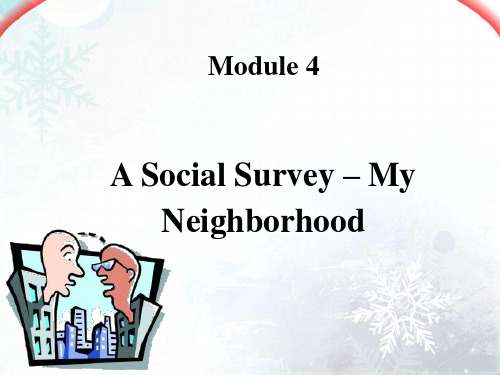
2. 非延续性动词 (终止性动词/短暂性动词)
不能和表示一段时间的状语连用,如: come, start, begin, leave, arrive, reach, open, close, give, lend, borrow, finish, break, see, hear, notice, find, understand, die 等。
而一般过去时长用非持续性动词,如: come, go, leave, start, die, finish, become, get married 等。
延续性动词与非延续性动词:
1. 延续性动词可以与表示一段时间的状 语连用,如: live, study, work, teach, stay, read, play, fly, talk, rain, eat, run 等
A. How long were; being
B. How long have; got
C
C. How long have; been
D. How long did; get
2. It is the most instructive lecture that I
___D____ since I came to this school. (2011湖南)
Module 4
A Social Survey – My Neighborhood
现在完成时
现在完成时用来表示之前已发生或完成 的动作或状态,其结果的确和现在有联 系。动作或状态发生在过去但它的影响 现在还存在;也可表示持续到现在的动 作或状态。其构成: have (has) +过去分 词 John has broken his left leg.
外研版高考英语必修1Module4《ASocialSurveyMyNeighbourhood》wor
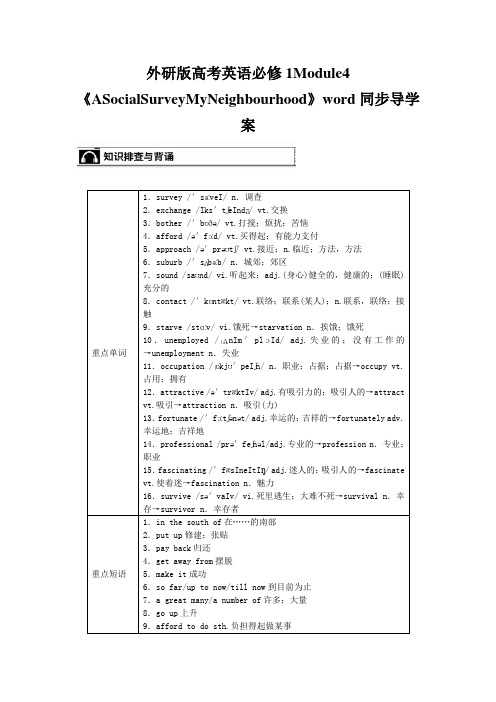
外研版高考英语必修1Module4《ASocialSurveyMyNeighbourhood》word同步导学案重点单词1.survey /′sɜːveI/ n.调查2.exchange /Iks′tʃeIndʒ/ vt.交换3.bother /′bɒðə/ vt.打搅;烦扰;苦恼4.afford /ə′fɔːd/ vt.买得起;有能力支付5.approach /ə′prəʊtʃ/ vt.接近;n.临近;方法,方法6.suburb /′sʌbɜːb/ n.城郊;郊区7.sound /saʊnd/ vi.听起来;adj.(身心)健全的,健康的;(睡眠)充分的8.contact /′kɒntækt/ vt.联络;联系(某人);n.联系,联络;接触9.starve /stɑːv/ vi.饿死→starvation n.挨饿;饿死10.unemployed /ˌʌnIm′plɔId/ adj.失业的;没有工作的→unemployment n.失业11.occupation /ˌɒkjʊ′peIʃn/ n.职业;占据;占据→occupy vt.占用;拥有12.attractive /ə′træktIv/ adj.有吸引力的;吸引人的→attract vt.吸引→attraction n.吸引(力)13.fortunate /′fɔːtʃənət/ adj.幸运的;吉祥的→fortunately adv.幸运地;吉祥地14.professional /prə′feʃnəl/adj.专业的→profession n.专业;职业15.fascinating /′fæsIneItIŋ/ adj.迷人的;吸引人的→fascinate vt.使着迷→fascination n.魅力16.survive /sə′vaIv/ vi.死里逃生;大难不死→survival n.幸存→survivor n.幸存者重点短语1.in the south of在……的南部2.put up修建;张贴3.pay back归还4.get away from摆脱5.make it成功6.so far/up to now/till now到目前为止7.a great many/a number of许多;大量8.go up上升9.afford to do sth.负担得起做某事经典句型1.It’s been six years since we last saw each other,you know. 要明白,我们六年没见面了。
- 1、下载文档前请自行甄别文档内容的完整性,平台不提供额外的编辑、内容补充、找答案等附加服务。
- 2、"仅部分预览"的文档,不可在线预览部分如存在完整性等问题,可反馈申请退款(可完整预览的文档不适用该条件!)。
- 3、如文档侵犯您的权益,请联系客服反馈,我们会尽快为您处理(人工客服工作时间:9:00-18:30)。
noisy
traditional
Read about the homes of the two students. Then tell your partner which one is more similar to yours. In what way are they similar?
Help Xiao Li to complete his description of his home.
for example 可以用于句首, 句中, 句 末。往往用逗号与被列举的事物隔开。 e.g. 我喜欢喝茶和果汁类的饮料。 I like drinks such as tea and juice. = I like such drinks as tea and juice.
• Another problem is that it is becoming more and more difficult for farmers to make money from their farms. make money 赚钱 This film is making a lot of money in America. It is one thing to make money, and it is another to spend it.
I live ____ the province ___ Guangdong, a in of city in __________ China. I live ________ my southern with husband and son in the ______ of Shaoguan. city The building _______ we live in is neither too which new _____ too old. I live _____ the third floor nor on of a _____________ (九层楼的) building nine-storey _________ stones and bricks. made of
John Denver is a very famous singer
of country music all over the world.
• 约翰· 丹佛是美国老牌的乡村歌手, • “乡村音乐的代名词”,其唱片曾获 24次金唱片奖及4次白金唱片奖。在美 国乡村音乐史上,其地位无人可敌。
• 经典歌曲 Country Road Take me home • 乡村路带我回家
a number of 与 the number of 的区别 a number of “许多,若干”,谓语动词用 复数形式; the number of “……的数量”,谓语动词 用单数形式
A number of students are playing on the ground. The number of students is 20.
Module 4
A Social Survey – My Neighborhood
Discussion
Do you know the rank of the height of buildings in the world? Why are Chinese cities so wild about building world-class skyscrapers?
2. Why do some villages remain?
Because people from the cities have bought a “second home” in the village.
3 What are the problems? 1) Young people move to towns for a livelier life and for work. 2) People can’t afford village house because city-dwellers buy them up. 3) Farmers sell their land and stop farming.
Burj Khalifa
迄今为止最高的人造建筑 物,高达818米
Taipei 101
目前世界第二高楼( 2010年
Shanghai World Financial Center
International Commerce Centre
Where is your hometown?
How do you describe your hometown to others?
Important phrases in Module 4:
到目前为止 修建 up to now put up a great many
许多, 大量
上升
go up
remain pretty sound like
仍然漂亮
听起来像
饿死 例如
starve to death for example join a committ resulted in by these problems? Many villages in western Europe will have to fight to survive. The countryside will be a sadder and uglier place. 5. What can you do to save the countryside in western Europe?
3) remain to be done 尚待, 留待
Come on! A lot f work remains to be
done. 快点吧,还有许多工作要做呢!
4. such as 与 for example
such as 往往不能把事物全部列出,可 以以 “名词 (,) +such as +被列举的事 物” 和 “such+名词+as+被列举的事 物”形式出现。
2. The price of homes goes up and people from the area cannot afford to buy a house there. go up 表示“(价格等)上涨” The price of these villas by the sea has been going up. 这些海滨别墅的价格一直在上涨。 对比: The price of fresh vegetables has been brought up.
Listen the text and answer the following questions. 1. In which countries is the countryside changing? In some countries in western Europe, such as France, Spain and Britain
• Reading the text quickly and answer following questions 1.In which countries is the countryside changing? 2. Why do some villages remain? 3.What are the problems? 4.What will be resulted in by these problems?
我很想和你一起去度假, 可抽不出时间。
The hotel wanted to charge $150 for the room service, but we couldn’t B ____ to live in such an expensive hotel. A. pay C. charge 得起。 B. afford D. pay for
Language points
1. There are a number of reasons for this. reason for… 表示“…的原因”,后接名词/代词或 者v-ing形式。 reason why 也可以表示“…的 原因” 后面跟句子。 This is the reason for his being late. This is the reason why he is late.
解析 afford to do sth.负担得起,支付
3. Remain vi. 1) 留下, 遗留 I went to the city, but my brother remained at home. 2) 继续, 仍然是 The deaths of the innkeeper still remains a mystery.
加入委员会
购物中心 买得起房子
在地震中幸存 survive an earthquake afford to buy a house
suburb
countryside
在北郊:
in the northern suburb. in a suburb in the north of the city.
Please use some adjectives to describe your ideal home.
quiet peaceful modern huge lovely attractive
Beijing
Chengdu
Harbin
Lijiang
Shanghai
Shenzhen
Sanya
Yangzhou
cottage [ ˈkɔtidʒ]
Bungalow [ˈbʌŋɡələu ] apartment apartment block high-rise building Skyscraper
[ˈskaiˈskreipə ]
